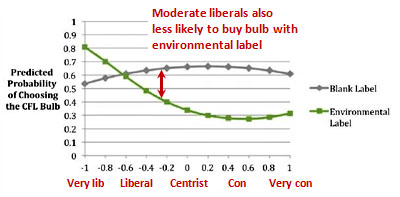A few weeks ago, in a post that was mainly a response to Jonah Goldberg’s dismissive attitude toward renewable energy, I mentioned a recent study showing that although liberals and conservatives were about equally likely to buy an energy efficient CFL lightbulb even if it cost more than an old-school bulb, conservatives were less likely to buy the bulb if the packaging included the message “Protect the Environment.”
That’s what the abstract of the article said, anyway: “Conservative individuals were less likely to purchase a more expensive energy-efficient light bulb when it was labeled with an  environmental message than when it was unlabeled.” But Tim Carney points out that there’s a little more to it than that:
environmental message than when it was unlabeled.” But Tim Carney points out that there’s a little more to it than that:
Most of the coverage of this made it sound like only conservatives were turned off by the label, and that it was clearly for petty reasons. While really, most people, including generally liberal people, became less likely to buy the bulbs with the label.
The green line in the chart shows how likely people are to buy the bulb with the environmental message. And Carney is right: It crosses below the gray line at an ideology score of -0.6, right in the middle of the liberal spectrum. Just about everyone was turned off by the message except hardcore liberals.
That’s actually kind of interesting. And it also shows the danger of relying on a journal abstract when you don’t have access to the full paper. It’s not that the abstract was wrong—increased conservatism was associated with increased resistance to the message—but there’s more to the story.

















